The 2013-2014 season of the China Badminton Super League opened to little fanfare but with so much of the game’s talent, things won’t take long heating up. Our Badzine Correspondent takes us through one of the key early matchups of the new, revamped league season.
By Renee Yang, Badzine Correspondent live in Dongguan. Photos: Guandong Century City Badminton Club (live)
September 28th marked the first round of group play that launched the 2013-2014 season of the China Badminton Super League. The events were away the spotlight, as usual: no commercials, no promotion campaign, and little media attention, despite the fact that most of the stars of the game of badminton have been contracted by the league’s twelve clubs.
These outward clues may in a way have heralded a plain season as before, causing many to give up hope of seeing any new adventures at the beginning of the season. But after the competition between Guangdong Century City Badminton Club and the military, or Bayi Club in the third round of group ties on October 5th, some have started to change their minds.
New rules
As we already know, the CBSL features Sudirman Cup-style mixed team ties and the competition rules have been roughly the same as the Sudirman Cup for the last three seasons. But this season, the CBSL organization committee made significant changes on the rules.
First, the 21-point games have been scrapped in favour of a greatly scaled down 11-point system in order to reduce duration of each competition to meet the requirement of live telecasts. By this means, the CBSL organization committee was able to convince sports channel CCTV to broadcast some focus competitions both in the group and knock-out stages.
With live telecasts, commercial prospects for the CBSL seem much brighter and it may attract more and more financial supports from business enterprises. The scoring change has also created more uncertainty and suspense for each match.
Second, they introduced mixed three-on-three into the team competition. 3-on-3 was originally used as a training drill inside national team to enhance the reaction speed of doubles players. With three players on each side, the speed and pace of the match is very quick and exciting. Now each competition include 5 matches: men’s singles, women’s singles, and mixed 3-on-3match are fixed, while another two matches alternating among men’s doubles, mixed doubles and women’s doubles.
A third alteration is the addition of one amateur men’s doubles match before the start of each competition. In an attempt to increase public involvement and interaction with the CBSL, the players are selected from local amateur events. As members of the clubs they were rewarded with some training courses. By playing in the CBSL events, the players could earn points of CBA amateur ranking system or even prizes if their performances are good enough.
Early action: Bayi vs. Century
The military club is obviously the most eye-catching club in this CBSL since they have badminton superstar Lin Dan and 2012 London Olympic women’s singles gold medallist Li Xuerui.
The Century City Club is a new force in the CBSL. With the strong financial support from local Dongguan real estate developer Guangdong Century City Group, the club has designs on the CBSL championship this season. They have brought into the club legendary Chinese coach Tang Xianhu, men’s singles ace Lee Chongwei, 2012 London Olympic men’s doubles champions Cai Yun and Fu Haifeng, as well as other top Chinese badminton players such as Jiang Yanjiao, Liu Xin, and Tang Jinhua. Moreover, the club also owns the famous Li Yongbo Badminton School so they seem intent on providing badminton talents into the future.
With all the big names in these two teams, it was inevitable that the competition between Century City and Bayi would be the focus of the third round. CCTV broadcast the matches live, and the media and badminton forums began to clamour for another battle between Lin Dan and Lee Chong Wei. So not surprisingly, the stands at Dongguan Sports Stadium, the home court of Century City, were packed with eager spectators.
Soon the crowd’s spirits were dampened when they saw the line-up on the screen. Lin Dan was absent while Li Xuerui would play women’s doubles instead of women’s singles, the tie was put out of Bayi’s reach from the very beginning. In the post-match interview, the Bayi coach explained that Lin Dan had sprained his foot during his match in the second round, and Li Xuerui was suffering from a knee injury. Fortunately, the disappointed audience would find there were still some interesting matches to watch even without Lin Dan.
MD: Cai Yun / Fu Haifeng (Century City) vs. He Hanbin / Luo Cheng (Bayi)
The Olympic champions obviously prepared very well and adapted rapidly to the new 11-point system. Compared to their opponents, Cai & Fu had advantages on every aspects – serve and receive, defense and attacking – so they were relatively relaxed and could play in their favoured mode. Cai’s defense and Fu’s smashes won rapturous ovation from the audience. They took an early 7-1 lead in the first game and won it soon afterward.
In the second game, Cai and Fu’s big advantages led them to slack off for a while, and their opponents changed tactics by being sharper on the serve to get more attacking chances and force Cai and Fu into making errors. The Bayi pair took several points in a row to get the lead but they eventually blew two game points and the Olympic champions, more stable at crucial points, finally took the second game 13-11.
Mixed 3-on-3: Cai Yun / Fu Haifeng / Tang Jinhua (Century City) vs. He Hanbin / Xiong Shuai / Xiao Jia (Bayi)
The Century City trio had some advantages compared to Bayi, but the latter one had better tactics and cooperation. First, Bayi selected two men’s players to serve and receive, while Century team made a big mistake by selecting Cai & Tang. Thus Bayi had an edge over their opponents in the front court.
Second, during the match, Bayi tried to attack Tang and Cai, avoiding hitting the shuttle to the side where Fu’s powerful, quick drives would be too much for them to handle. This tactic worked very well by breaking the link between Cai and Fu, diminishing their advantage on attacking.
Third, Century City were a bit confused on pace and position. Tang could not keep pace with her team-mates and slowed down the speed of their play, while Xiao Jia, Bayi’s woman player, tried to follow the pace of the men, hiding below the net tape most of the time and letting her team-mates handle most of the hits. So the match became more even, and there were many wonderful rallies to watch. The crowd’s passion was lit and all stood and cheered for the home team, who finally won the match that would prove to be the highlight of the day.
During the post match interview, Cai & Fu admitted that they were adequately prepared for the new 11-point system.
“Since the match would be finished very fast, if you could not concentrate on play at the very beginning, you’d lost points rapidly, and you wouldn’t have much time to level the score,” said Fu, who also pointed that new point system could save players’ stamina, giving elder players an advantage. On the other hand, though, the new system also requires players to employ more energy and concentration.
Both Cai and Fu gave credit to the home court spectators: “The spectators understood the game very well and knew the right time to applaud or keep quiet,” said Cai Yung.
“The home court’s atmosphere is the best I had ever experienced for the last four seasons,” added Fu Haifeng
MS: Lee Chong Wei (Century City) vs. Wu Xin (Bayi)
This match was somewhat like a one-man show by Lee Chong Wei, as the youngster from the Military club could not follow his pace at all, giving Lee many chances to kill, rush, or to play drops. The spectators obvious enjoyed his performance even it was an uneven match, they shouted and cheered for Chongwei’s every deception, net play and smash. Lee Chong Wei’s wife, former women’s singles player Wong Mew Choo, was also present in the stands to watch the match, which Lee took in only 12 minutes.
When Lee was leaving the court after match, he was surprised by a heart-warming scene where some spectators in the stands, conducted by a DJ, yelled “Happy birthday, Chong Wei!”
When asked why he choose to play for the Century City, Lee said: “I have a good relationship with the boss of the Century City Group, so when he invited me to join his club last year, I agreed immediately. I think the most important thing is happiness and I believed that I would have a pleasant experience in the club.
“Moreover, the club had invited elite players like Cai and Fu, the Olympic champions, and especially the legendary coach Tang Xianhu. I really want to learn from him, and I expect to discuss my play and weakness with him during the season,” Lee added, also mentioning that he would try to attend more competitions in this season, according to his arrangement with the club.
As for Lin Dan’s absence, Chong Wei said he was not disappointed, “I would really appreciate the chance to play with him, but whoever the rival is, I will try my best at every match. I understand that spectators like to watch us play, but I think there still chances for them to watch me playing with Lin Dan someday.”
For the othere two matches, Liu Xin won in straight games over Qin Jingjing while Yu Xiaohan / Tang Jinhua did the same over Li Xuerui / Feng Chen.
After the competition finished, Century City Club arranged a signing session with Lee Chong Wei and Cai Yun / Fu Haifeng as reward to fans who support the club, and also as compensation to those who may have felt a little disappointed about Lin Dan’s absence. The signing session lasted for half an hour, and for the numerous fans who still did not got the chance, the Century City manager appeased the crowds by promising another signing session in the future.
Commercial forces are beginning to have an active influence on the organization of the CBSL. They have finally realized the importance of meeting the needs of the fans. As for whether the 2013-2014 season will be a key new chapter in the development of China Badminton Super League, one must wait and see. Jia you!!
![CHINA LEAGUE – New rules, new force The 2013-2014 season of the China Badminton Super League opened to little fanfare but with so much of the game’s talent, things won’t take long heating up. Our Badzine Correspondent […]](http://www.badzine.net/wp-content/uploads/Newsflash-thumbnail.png)
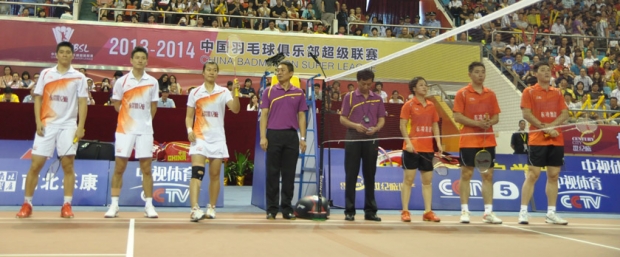
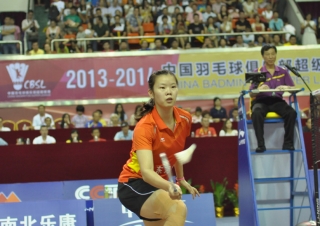
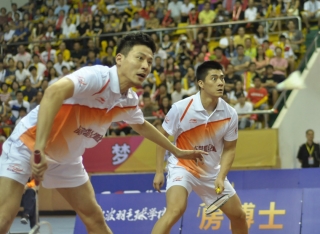
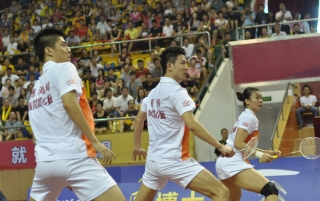
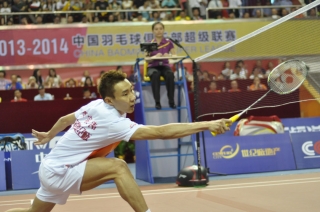
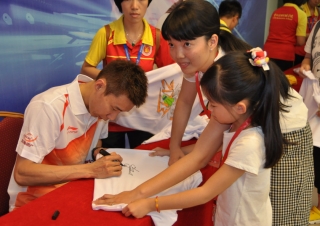
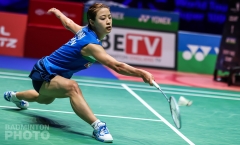
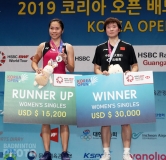

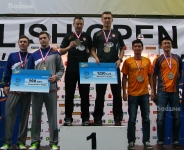
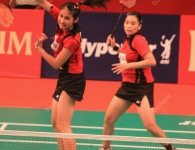
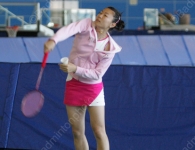
Leave a Reply